Joni Mitchell | ||
| Allmusic Biography : No female artist better typified the singer/songwriter movement of the 70s than Joni Mitchell, though her public image as the serious, sensitive woman with a guitar shortchanged her abilities, ambitions, and accomplishments. Mitchells gift for writing personal, folk-inspired songs about the thorny side of life and love was inarguable (particularly on albums like 1970s Ladies of the Canyon and 1971s Blue), but Mitchell also brought the same smarts and eloquence to glossy pop on her commercial breakthrough, 1974s Court & Spark, and she was incorporating jazz and world music into her work long before either was fashionable in American pop music (and she also collaborated with respected jazz artists such as Charles Mingus, Pat Metheny, and Jaco Pastorius, something none of her peers accomplished). At her best, Mitchell was one of the finest and most adventurous artists of her generation, and a key inspiration to many women in music as a talent who refused to be hemmed in by boundaries of genre or gender. Born Roberta Joan Anderson in Fort McLeod, Alberta, Canada, on November 7, 1943, she was stricken with polio at the age of nine; while recovering in a childrens hospital, she began her performing career by singing to the other patients. After later teaching herself to play guitar with the aid of a Pete Seeger instruction book, she went off to art college, and became a fixture on the folk music scene around Alberta. After relocating to Toronto, she married folksinger Chuck Mitchell in 1965, and began performing under the name Joni Mitchell. A year later the couple moved to Detroit, Michigan, but separated soon after; Joni remained in the Motor City, however, and won significant press acclaim for her burgeoning songwriting skills and smoky, distinctive vocals, leading to a string of high-profile performances in New York City. There she became a cause célèbre among the media and other performers; after she signed to Reprise in 1967, David Crosby offered to produce her debut record, a self-titled acoustic effort that appeared the following year. Her songs also found great success with other singers: in 1968, Judy Collins scored a major hit with the Mitchell-penned "Both Sides Now," while Fairport Convention covered "Eastern Rain" and Tom Rush recorded "The Circle Game." Thanks to all of the outside exposure, Mitchell began to earn a strong cult following; her 1969 sophomore effort, Clouds, reached the Top 40, while 1970s Ladies of the Canyon sold even better on the strength of the single "Big Yellow Taxi." It also included her anthemic composition "Woodstock," a major hit for Crosby, Stills, Nash & Young. Still, the commercial and critical approval awarded her landmark 1971 record Blue was unprecedented: a luminous, starkly confessional set written primarily during a European vacation, the album firmly established Mitchell as one of pop musics most remarkable and insightful talents. Predictably, she turned away from Blues incandescent folk with 1972s For the Roses, the first of the many major stylistic turns she would take over the course of her daring career. Backed by rock-jazz performer Tom Scott, Mitchells music began moving into more pop-oriented territory, a change typified by the single "You Turn Me On (Im a Radio)," her first significant hit. The follow-up, 1974s classic Court and Spark, was her most commercially successful outing: a sparkling, jazz-accented set, it reached the number two spot on the U.S. album charts and launched three hit singles -- "Help Me," "Free Man in Paris," and "Raised on Robbery." After the 1974 live collection Miles of Aisles, Mitchell emerged in 1975 with The Hissing of Summer Lawns, a bold, almost avant-garde record that housed her increasingly complex songs in experimental, jazz-inspired settings; "The Jungle Line" introduced the rhythms of African Burundi drums, placing her far ahead of the pop worlds mid-80s fascination with world music. 1976s Hejira, recorded with Weather Report bassist Jaco Pastorius, smoothed out the musics more difficult edges while employing minimalist techniques; Mitchell later performed the albums first single, "Coyote," at the Bands Last Waltz concert that Thanksgiving. Her next effort, 1977s two-record set Don Juans Reckless Daughter, was another ambitious move, a collection of long, largely improvisational pieces recorded with jazz players Larry Carlton and Wayne Shorter, Chaka Khan, and a battery of Latin percussionists. Shortly after the records release, Mitchell was contacted by the legendary jazz bassist Charles Mingus, who invited her to work with him on a musical interpretation of T.S. Eliots Four Quartets. Mingus, who was suffering from Lou Gehrigs disease, sketched out a series of melodies to which Mitchell added lyrics; however, Mingus died on January 5, 1979, before the record was completed. After Mitchell finished their collaboration on her own, she recorded the songs under the title Mingus, which was released the summer after the jazz titans passing. Following her second live collection, 1980s Shadows and Light, Mitchell returned to pop territory for 1982s Wild Things Run Fast; the first single, a cover of the Elvis Presley hit "(Youre So Square) Baby I Dont Care," became her first chart single in eight years. Shortly after the albums release, she married bassist/sound engineer Larry Klein, who became a frequent collaborator on much of her subsequent material, including 1985s synth-driven Dog Eat Dog, co-produced by Thomas Dolby. Mitchells move into electronics continued with 1988s Chalk Mark in a Rain Storm, featuring guests Peter Gabriel, Willie Nelson, Tom Petty, and Billy Idol. Mitchell returned to her roots with 1991s Night Ride Home, a spare, stripped-down collection spotlighting little more than her voice and acoustic guitar. Prior to recording 1994s Turbulent Indigo, she and Klein separated, although he still co-produced the record, which was her most acclaimed work in years. In 1996, she compiled a pair of anthologies, Hits and Misses, which collected her chart successes as well as underappreciated favorites. A new studio album, Taming the Tiger, followed in 1998. Both Sides Now, a collection of standards, followed in early 2000. Two years later, Mitchell resurfaced with the double-disc release Travelogue. She announced in October 2002 that this would be her last album ever, for shed grown tired of the industry. She told W magazine that she intended to retire. She also claimed she would never sign another corporate label deal, and in Rolling Stone blasted the recording industry for being "a cesspool." By the time Travelogue appeared a month later, Mitchell had simmered down and her plans to call it quits had been axed. Numerous compilations and remasters appeared between 2002 and 2006, culminating in the release of the independent Shine in 2007. In 2014, Mitchell helped compile her first box set anthology, Love Has Many Faces: A Quartet, A Ballet, Waiting to Be Danced, which featured remastered versions of 53 songs from her back catalog, all dealing with some aspect of love and relationships. | ||
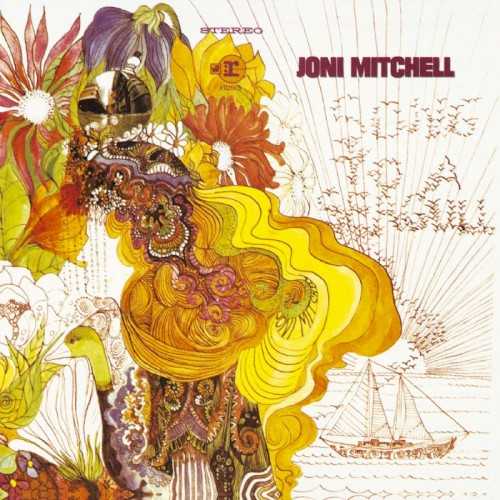 | Album: 1 of 33 Title: Song to a Seagull Released: 1968-03 Tracks: 10 Duration: 38:07 Scroll: Up Down Top Bottom 25% 50% 75% Spotify Allmusic Wikipedia AlbumCover | 1 I Had a King (03:37) 2 Michael From Mountains (03:41) 3 Night in the City (02:29) 4 Marcie (04:35) 5 Nathan La Franeer (03:20) 6 Sisotowbell Lane (04:04) 7 The Dawntreader (05:04) 8 The Pirate of Penance (02:44) 9 Song to a Seagull (03:51) 10 Cactus Tree (04:38) |
| Song to a Seagull : Allmusic album Review : Joni Mitchells debut release is a concept album. Side one, subtitled "I Came to the City," generally exhibits songs about urban subjects that are often dour or repressed in some way. "Out of the City and Down to the Seaside," by contrast, is a celebration of nature and countryside, mostly containing selections of a charming, positive, or more outgoing nature. What sets this release apart from those of other confession-style singer/songwriters of the time is the craft, subtlety, and evocative power of Mitchells lyrics and harmonic style. Numbers such as "Marcie," "Michael From Mountains," "The Dawntreader," and "The Pirate of Penance" effectively utilize sophisticated chord progressions rarely found in this genre. Verses are substantive and highly charged, exhibiting careful workmanship. "Song to a Seagull" has graceful and vivid lyrics about the joys of freedom set to a haunting, wide-ranging vocal line. Conversely, "Cactus Tree" explores the downside of a no-strings-attached approach to life, the fear of committing to a relationship (ironically wedding these words to a hopeful melody and pulsating guitar texture). "Marcie" utilizes poignant, twisting music set to desolately lonely lyrics about a jilted woman; the recurrent use of red and green imagery in the verses is especially clever. Character studies such as "I Had a King" and "Nathan la Franeer" are painfully bleak in contrast to the lithe domestic scene of "Sisotowbell Lane" and the winsomely reserved love song "Michael From Mountains." Unusual in her oeuvre are the overlapping dialogue prose manner of "The Pirate of Penance" and the jaunty honky tonk stylings of "Night in the City." Mitchell sings in a light, gossamer, at times diffident manner; vocal harmony is sparingly employed here. David Crosbys production is simple and effective. This excellent debut is well worth hearing. | ||
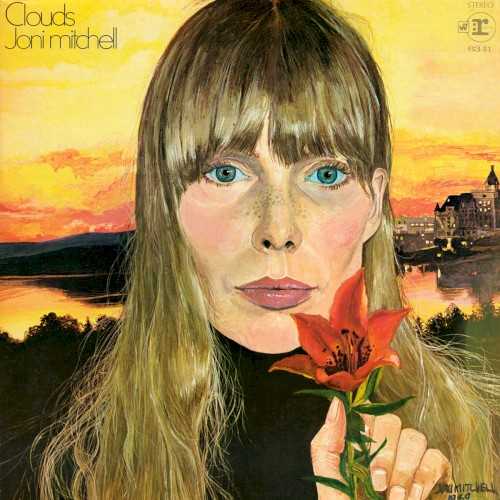 | Album: 2 of 33 Title: Clouds Released: 1969-05 Tracks: 10 Duration: 37:41 Scroll: Up Down Top Bottom 25% 50% 75% Spotify TrackSamples Allmusic AlbumCover | 1 Tin Angel (04:09) 2 Chelsea Morning (02:35) 3 I Dont Know Where I Stand (03:13) 4 That Song About the Midway (04:37) 5 Roses Blue (03:52) 6 The Gallery (04:12) 7 I Think I Understand (04:27) 8 Songs to Aging Children Come (03:10) 9 The Fiddle and the Drum (02:49) 10 Both Sides, Now (04:34) |
| Clouds : Allmusic album Review : Clouds is a stark stunner, a great leap forward for Joni Mitchell. Vocals here are more forthright and assured than on her debut and exhibit a remarkable level of subtle expressiveness. Guitar alone is used in accompaniment, and the variety of playing approaches and sounds gotten here is most impressive. "The Fiddle and the Drum," a protest song that imaginatively compares the Vietnam-era warmongering U.S. government to a bitter friend, dispenses with instrumental accompaniment altogether. The sketches presented of lovers by turns depressive ("Tin Angel"), roguish ("That Song About the Midway"), and faithless ("The Gallery") are vividly memorable. Forthright lyrics about the unsureness of new love ("I Dont Know Where I Stand"), misuse of the occult ("Roses Blue"), and mental illness ("I Think I Understand") are very striking. Mitchells classic singer/songwriter standards "Chelsea Morning" and "Both Sides Now" respectively receive energetically vibrant and warmly thoughtful performances. Imaginatively unusual and subtle harmonies abound here, never more so in her body of work than on the remarkable "Songs to Aging Children Come," which sets floridly impressionistic lyrics to a lovely tune that is supported by perhaps the most remarkably sophisticated chord sequence in all of pop music. Mitchells riveting self-portrait on the albums cover is a further asset. This essential release is a must-listen. | ||
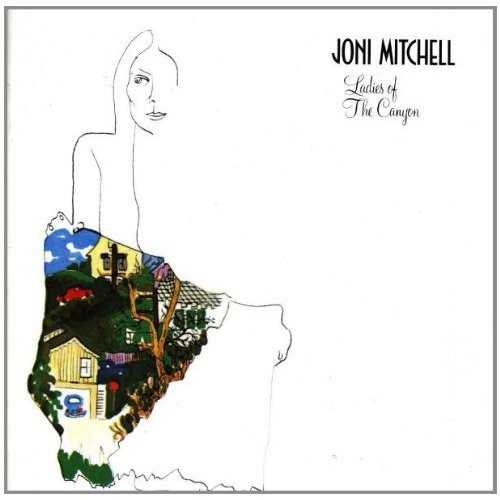 | Album: 3 of 33 Title: Ladies of the Canyon Released: 1970-04 Tracks: 12 Duration: 44:55 Scroll: Up Down Top Bottom 25% 50% 75% Spotify TrackSamples Wikipedia Allmusic AlbumCover | 1 Morning Morgantown (03:13) 2 For Free (04:31) 3 Conversation (04:26) 4 Ladies of the Canyon (03:32) 5 Willy (03:00) 6 The Arrangement (03:34) 7 Rainy Night House (03:24) 8 The Priest (03:40) 9 Blue Boy (02:54) 10 Big Yellow Taxi (02:15) 11 Woodstock (05:28) 12 The Circle Game (04:52) |
| Ladies of the Canyon : Allmusic album Review : This wonderfully varied release shows a number of new tendencies in Joni Mitchells work, some of which would come to fuller fruition on subsequent albums. "The Arrangement," "Rainy Night House," and "Woodstock" contain lengthy instrumental sections, presaging the extensive non-vocal stretches in later selections such as "Down to You" from Court and Spark. Jazz elements are noticeable in the wind solos of "For Free" and "Conversation," exhibiting an important influence that would extend as late as Mingus. The unusually poignant desolation of "The Arrangement" would surface more strongly in Blue. A number of the selections here ("Willy" and "Blue Boy") use piano rather than guitar accompaniment; arrangements here are often more colorful and complex than before, utilizing cello, clarinet, flute, saxophone, and percussion. Mitchell sings more clearly and expressively than on prior albums, most strikingly so on "Woodstock," her celebration of the pivotal 1960s New York rock festival. This number, given a haunting electric piano accompaniment, is sung in a gutsy, raw, soulful manner; the selection proves amply that pop music anthems dont all have to be loud production numbers. Songs here take many moods, ranging from the sunny, easygoing "Morning Morgantown" (a charming small-town portrait) to the nervously energetic "Conversation" (about a love triangle in the making) to the cryptically spooky "The Priest" (presenting the speakers love for a Spartan man) to the sweetly sentimental classic "The Circle Game" (denoting the passage of time in touching terms) to the bouncy and vibrant single "Big Yellow Taxi" (with humorous lyrics on ecological matters) to the plummy, sumptuous title track (a celebration of creativity in all its manifestations). This album is yet another essential listen in Mitchells recorded canon. | ||
 | Album: 4 of 33 Title: Blue Released: 1971-06 Tracks: 10 Duration: 36:12 Scroll: Up Down Top Bottom 25% 50% 75% Spotify TrackSamples Allmusic AlbumCover | 1 All I Want (03:33) 2 My Old Man (03:35) 3 Little Green (03:28) 4 Carey (03:03) 5 Blue (03:04) 6 California (03:50) 7 This Flight Tonight (02:52) 8 River (04:05) 9 A Case of You (04:23) 10 The Last Time I Saw Richard (04:16) |
| Blue : Allmusic album Review : Sad, spare, and beautiful, Blue is the quintessential confessional singer/songwriter album. Forthright and poetic, Joni Mitchells songs are raw nerves, tales of love and loss (two words with relative meaning here) etched with stunning complexity; even tracks like "All I Want," "My Old Man," and "Carey" -- the brightest, most hopeful moments on the record -- are darkened by bittersweet moments of sorrow and loneliness. At the same time that songs like "Little Green" (about a child given up for adoption) and the title cut (a hymn to salvation supposedly penned for James Taylor) raise the stakes of confessional folk-pop to new levels of honesty and openness, Mitchells music moves beyond the constraints of acoustic folk into more intricate and diverse territory, setting the stage for the experimentation of her later work. Unrivaled in its intensity and insight, Blue remains a watershed. | ||
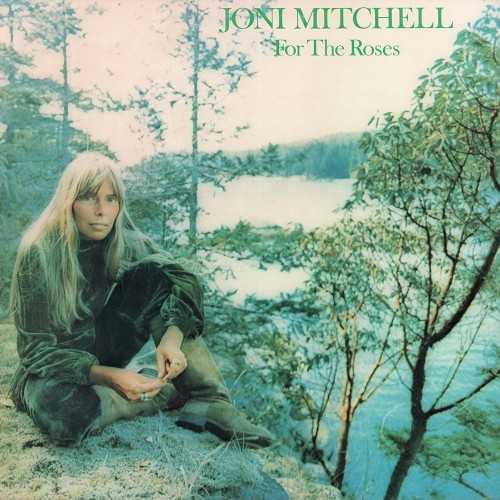 | Album: 5 of 33 Title: For the Roses Released: 1972-10 Tracks: 12 Duration: 40:24 Scroll: Up Down Top Bottom 25% 50% 75% Spotify TrackSamples Allmusic AlbumCover | 1 Banquet (03:01) 2 Cold Blue Steel and Sweet Fire (04:17) 3 Barangrill (02:52) 4 Lesson in Survival (03:11) 5 Let the Wind Carry Me (03:56) 6 For the Roses (03:48) 7 See You Sometime (02:56) 8 Electricity (03:01) 9 You Turn Me on Im a Radio (02:39) 10 Blonde in the Bleachers (02:42) 11 Woman of Heart and Mind (02:38) 12 Judgement of the Moon and Stars (Ludwigs Tune) (05:19) |
| For the Roses : Allmusic album Review : On For the Roses, Joni Mitchell began to explore jazz and other influences in earnest. As one might expect from a transitional album, there is a lot of stylistic ground explored, including straight folk selections using guitar ("For the Roses") and piano ("Banquet," "See You Sometime," "Lesson in Survival") overtly jazzy numbers ("Barangrill," "Cold Blue Steel and Sweet Fire," and hybrids that cross the two "Let the Wind Carry Me," "Electricity," "Woman of Heart and Mind," "Judgment of the Moon and Stars"). "Blonde in the Bleachers" grafts a rock & roll band coda onto a piano-based singer/songwriter main body. The hit single "You Turn Me on Im a Radio" is an unusual essay into country-tinged pop, sporting a Dylanesque harmonica solo played by Graham Nash and lush backing vocals. Arrangements here build solidly upon the tentative expansion of scoring first seen in Ladies of the Canyon. "Judgment of the Moon and Stars" and "Let the Wind Carry Me" present lengthy instrumental interludes. The lyrics here are among Mitchells best, continuing in the vein of gripping honesty and heartfelt depth exhibited on Blue. As always, there are selections about relationship problems, such as "Lesson in Survival," "See You Sometime," and perhaps the best of all her songs in this genre, "Woman of Heart and Mind." "Cold Blue Steel and Sweet Fire" presents a gritty inner-city survival scene, while "Barangrill" winsomely extols the uncomplicated virtues of a roadside truck stop. More than a bridge between great albums, this excellent disc is a top-notch listen in its own right. | ||
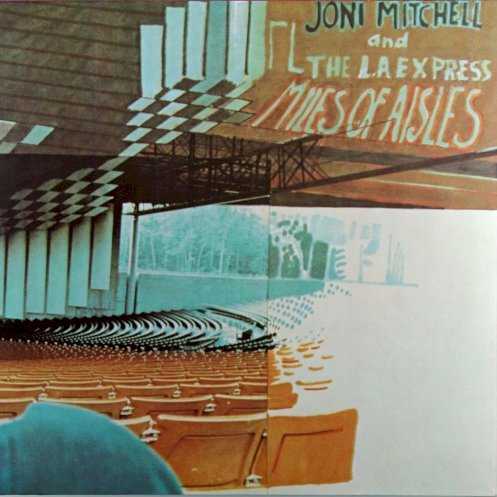 | Album: 6 of 33 Title: Miles of Aisles Released: 1974 Tracks: 18 Duration: 1:11:20 Scroll: Up Down Top Bottom 25% 50% 75% Spotify Wikipedia Allmusic AlbumCover | 1 You Turn Me on Im a Radio (03:55) 2 Big Yellow Taxi (03:09) 3 Rainy Night House (04:03) 4 Woodstock (04:29) 5 Cactus Tree (04:50) 6 Cold Blue Steel and Sweet Fire (05:23) 7 Woman of Heart and Mind (03:30) 8 A Case of You (04:18) 9 Blue (02:49) 1 Circle Game (05:20) 2 Peoples Parties (02:30) 3 All I Want (03:20) 4 Really Good for Free (04:15) 5 Both Sides Now (04:14) 6 Carey (03:20) 7 The Last Time I Saw Richard (03:35) 8 Jericho (03:26) 9 Love or Money (04:50) |
| Miles of Aisles : Allmusic album Review : Like most live albums, this two-record set was a profit-taking release on which the artist re-presented many of her old songs for a new acceptance now that she had a larger pop audience. Backed by the pop-jazz ensemble the L.A. Express Mitchell reprised the best from her first five albums, pointedly ignoring Court and Spark, and including two new cuts, "Love or Money" and "Jericho." | ||
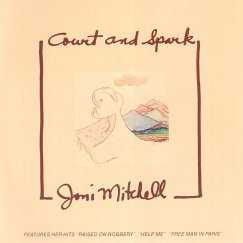 | Album: 7 of 33 Title: Court and Spark Released: 1974-04 Tracks: 11 Duration: 36:57 Scroll: Up Down Top Bottom 25% 50% 75% Spotify TrackSamples Wikipedia Allmusic AlbumCover | 1 Court and Spark (02:46) 2 Help Me (03:22) 3 Free Man in Paris (03:02) 4 People’s Parties (02:15) 5 Same Situation (02:57) 6 Car on a Hill (03:02) 7 Down to You (05:38) 8 Just Like This Train (04:24) 9 Raised on Robbery (03:06) 10 Trouble Child (04:00) 11 Twisted (02:21) |
| Court and Spark : Allmusic album Review : Joni Mitchell reached her commercial high point with Court and Spark, a remarkably deft fusion of folk, pop, and jazz which stands as her best-selling work to date. While as unified and insightful as Blue, the album -- a concept record exploring the roles of honesty and trust in relationships, romantic and otherwise -- moves away from confessional songwriting into evocative character studies: the hit "Free Man in Paris," written about David Geffen, is a not-so-subtle dig at the machinations of the music industry, while "Raised on Robbery" offers an acutely funny look at the predatory environment of the singles bar scene. Much of Court and Spark is devoted to wary love songs: both the title cut and "Help Me," the records most successful single, carefully measure the risks of romance, while "Peoples Parties" and "The Same Situation" are fraught with worry and self-doubt (standing in direct opposition to the music, which is smart, smooth, and assured from the first note to the last). | ||
 | Album: 8 of 33 Title: The Hissing of Summer Lawns Released: 1975-11 Tracks: 10 Duration: 42:37 Scroll: Up Down Top Bottom 25% 50% 75% Spotify TrackSamples Allmusic AlbumCover | 1 In France They Kiss on Main Street (03:19) 2 The Jungle Line (04:26) 3 Edith and the Kingpin (03:37) 4 Dont Interrupt the Sorrow (04:05) 5 Shades of Scarlett Conquering (04:59) 6 The Hissing of Summer Lawns (03:01) 7 The Boho Dance (03:50) 8 Harrys House / Centerpiece (06:48) 9 Sweet Bird (04:12) 10 Shadows and Light (04:17) |
| The Hissing of Summer Lawns : Allmusic album Review : Joni Mitchell evolved from the smooth jazz-pop of Court and Spark to the radical Hissing of Summer Lawns, an adventurous work that remains among her most difficult records. After opening with the graceful "In France They Kiss on Main Street," the album veers sharply into "The Jungle Line," an odd, Moog-driven piece backed by the rhythms of the warrior drums of Burundi -- a move into multiculturalism that beat the likes of Paul Simon, Peter Gabriel, and Sting to the punch by a decade. While not as prescient, songs like "Edith and the Kingpin" and "Harrys House -- Centerpiece" are no less complex or idiosyncratic, employing minor-key melodies and richly detailed lyrics to arrive at a strange and beautiful fusion of jazz and shimmering avant pop. | ||
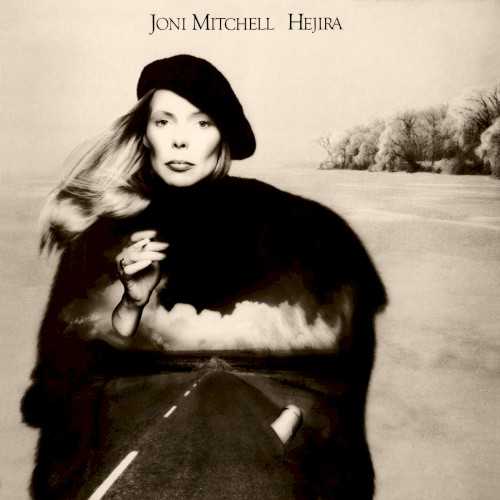 | Album: 9 of 33 Title: Hejira Released: 1976-11 Tracks: 9 Duration: 51:59 Scroll: Up Down Top Bottom 25% 50% 75% Spotify TrackSamples Wikipedia Allmusic AlbumCover | 1 Coyote (05:01) 2 Amelia (06:01) 3 Furry Sings the Blues (05:06) 4 A Strange Boy (04:19) 5 Hejira (06:42) 6 Song for Sharon (08:40) 7 Black Crow (04:22) 8 Blue Motel Room (05:04) 9 Refuge of the Roads (06:42) |
| Hejira : Allmusic album Review : Joni Mitchells Hejira is the last in an astonishingly long run of top-notch studio albums dating back to her debut. Some vestiges of her old style remain here; "Song for Sharon" utilizes the static, pithy vocal harmonies from Ladies of the Canyons "Woodstock," "Refuge of the Roads" features woodwind touches reminiscent of those in "Barangrill" from For the Roses, and "Coyote" is a fast guitar-strummed number that has precedents as far back as Clouds "Chelsea Morning." But by and large, this release is the most overtly jazz-oriented of her career up to this point -- hip and cool, but never smug or icy. "Blue Motel Room" in particular is a prototypic slow jazz-club combo number, appropriately smooth, smoky, and languorous. "Coyote," "Black Crow," and the title track are by contrast energetically restless fast-tempo selections. The rest of the songs here cleverly explore variants on mid- to slow-tempo approaches. None of these cuts are traditionally tuneful in the manner of Mitchells older folk efforts; the effect here is one of subtle rolls and ridges on a green meadow rather than the outgoing beauty of a flower garden. Mitchells verses, many concerned with character portraits, are among the most polished of her career; the most striking of these studies are that of the decrepit Delta crooner of "Furry Sings the Blues" and the ambivalent speaker of "Song to Sharon," who has difficulty choosing between commitment and freedom. Arrangements are sparse, yet surprisingly varied, the most striking of which is the kaleidoscopically pointillistic one used on "Amelia." Performances are excellent, with special kudos reserved for Jaco Pastorius melodic bass playing on "Refuge of the Roads" and the title cut. This excellent album is a rewarding listen. | ||
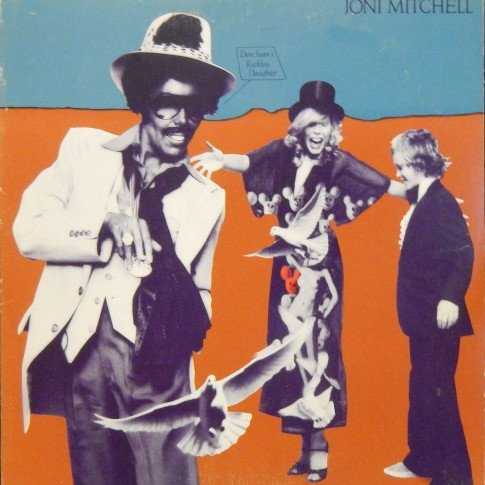 | Album: 10 of 33 Title: Don Juans Reckless Daughter Released: 1977-12 Tracks: 10 Duration: 59:34 Scroll: Up Down Top Bottom 25% 50% 75% Spotify TrackSamples Wikipedia Allmusic AlbumCover | 1 Overture / Cotton Avenue (06:35) 2 Talk to Me (03:40) 3 Jericho (03:25) 4 Paprika Plains (16:19) 1 Otis and Marlena (03:58) 2 The Tenth World (06:56) 3 Dreamland (04:39) 4 Don Juans Reckless Daughter (06:36) 5 Off Night Backstreet (03:20) 6 The Silky Veils of Ardor (04:04) |
| Don Juan's Reckless Daughter : Allmusic album Review : A big chunk of the pop audience Joni Mitchell had earned with Court and Spark in 1974 deserted her in 1975 and 1976 when the follow-ups, The Hissing of Summer Lawns and Hejira, proved more difficult works. With the pretentious double album Don Juans Reckless Daughter, Mitchell lost many of the loyal fans whod stuck with her from the beginning, but who, upon hearing her here as she spread her obscure poetic observations and thin melodies across whole sides of the album, found her disengaged from the close, personal observations that filled her best songs. This was Mitchells last album to go gold. | ||
![Allmusic album Review : In the months prior to the passing of legendary jazz bassist Charles Mingus, Joni Mitchell had been personally summoned by the bop pioneer to collaborate on a musical version of T.S. Eliots Four Quartets. The project would entail Mitchell to condense the text for Mingus to score instrumentally. He planned on utilizing a full orchestra, as well as the more traditional guitar and bass. They would accompany Mitchells vocals and the narration of selected portions of the text. After a few weeks of consideration, Mitchells reaction was that "[she]d rather condense the bible." Mingus then bestowed Mitchell with six melodies -- "Joni I" through "Joni VI" -- penned specifically for her. Mitchell spent a few weeks with Mingus -- who was totally immobilized from amyotropic lateral sclerosis (aka Lou Gehrigs Disease) -- during the spring of 1978. Their partnership advanced the half-dozen tunes. More importantly, it shook Mitchell from a three-month long writers block/drought -- yielding two of her best late-70s compositions: "God Must Be a Boogie Man" and the revisitation and completion of a track shed been wood-shedding, now titled "The Wolf That Lives in Lindsey." Incidentally, the former piece was inspired by the opening chapters of Mingus autobiography, Beneath the Underdog. Initial recordings during Mitchells stay with Mingus in New York City produced several interesting experimental sessions with the likes of Stanley Clarke (bass), Jan Hammer (keyboards), John McLaughlin (guitar), Gerry Mulligan (baritone sax), and Tony Williams (drums). A few of these recordings -- while rumored to have been lost, destroyed, or made otherwise unavailable -- were leaked into the trading community in the late 90s. Arguably, Mitchell could not have chosen any finer musicians than the sextet she ultimately incorporated into this work. The luminaries include Herbie Hancock (electric piano), Wayne Shorter (soprano sax), Jaco Pastorious (bass/horn arrangements), Peter Erskine (drums), Don Alias (congas), and Emil Richards (percussion). Sprinkled amongst these soulfully jazzy pieces are five "raps," or aural snapshots of the time Mitchell and Mingus spent together. Sadly, Charles Mingus passed before he was able to listen to this timeless and ageless paean to his remarkable contributions to bop and free jazz. mingus](../../images/joni_mitchell-mingus.jpg) | Album: 11 of 33 Title: Mingus Released: 1979-06 Tracks: 11 Duration: 37:24 Scroll: Up Down Top Bottom 25% 50% 75% Spotify TrackSamples Wikipedia Allmusic AlbumCover | 1 Happy Birthday 1975 (rap) (00:57) 2 God Must Be a Boogie Man (04:36) 3 Funeral (rap) (01:07) 4 A Chair in the Sky (06:42) 5 The Wolf That Lives in Lindsey (06:33) 6 Is a Muggin (rap) (00:07) 7 Sweet Sucker Dance (08:04) 8 Coin in the Pocket (rap) (00:11) 9 The Dry Cleaner From Des Moines (03:22) 10 Lucky (rap) (00:03) 11 Goodbye Pork Pie Hat (05:36) |
| Mingus : Allmusic album Review : In the months prior to the passing of legendary jazz bassist Charles Mingus, Joni Mitchell had been personally summoned by the bop pioneer to collaborate on a musical version of T.S. Eliots Four Quartets. The project would entail Mitchell to condense the text for Mingus to score instrumentally. He planned on utilizing a full orchestra, as well as the more traditional guitar and bass. They would accompany Mitchells vocals and the narration of selected portions of the text. After a few weeks of consideration, Mitchells reaction was that "[she]d rather condense the bible." Mingus then bestowed Mitchell with six melodies -- "Joni I" through "Joni VI" -- penned specifically for her. Mitchell spent a few weeks with Mingus -- who was totally immobilized from amyotropic lateral sclerosis (aka Lou Gehrigs Disease) -- during the spring of 1978. Their partnership advanced the half-dozen tunes. More importantly, it shook Mitchell from a three-month long writers block/drought -- yielding two of her best late-70s compositions: "God Must Be a Boogie Man" and the revisitation and completion of a track shed been wood-shedding, now titled "The Wolf That Lives in Lindsey." Incidentally, the former piece was inspired by the opening chapters of Mingus autobiography, Beneath the Underdog. Initial recordings during Mitchells stay with Mingus in New York City produced several interesting experimental sessions with the likes of Stanley Clarke (bass), Jan Hammer (keyboards), John McLaughlin (guitar), Gerry Mulligan (baritone sax), and Tony Williams (drums). A few of these recordings -- while rumored to have been lost, destroyed, or made otherwise unavailable -- were leaked into the trading community in the late 90s. Arguably, Mitchell could not have chosen any finer musicians than the sextet she ultimately incorporated into this work. The luminaries include Herbie Hancock (electric piano), Wayne Shorter (soprano sax), Jaco Pastorious (bass/horn arrangements), Peter Erskine (drums), Don Alias (congas), and Emil Richards (percussion). Sprinkled amongst these soulfully jazzy pieces are five "raps," or aural snapshots of the time Mitchell and Mingus spent together. Sadly, Charles Mingus passed before he was able to listen to this timeless and ageless paean to his remarkable contributions to bop and free jazz. | ||
 | Album: 12 of 33 Title: Shadows and Light Released: 1980 Tracks: 16 Duration: 1:12:23 Scroll: Up Down Top Bottom 25% 50% 75% Spotify Allmusic Wikipedia AlbumCover | 1 Introduction (01:51) 2 In France They Kiss on Main Street (04:14) 3 Edith and the Kingpin (04:09) 4 Coyote (04:56) 5 Goodby Pork Pie Hat (06:04) 6 The Dry Cleaner From Des Moines (04:33) 7 Amelia (06:40) 8 Pats Solo (03:10) 9 Hejira (07:45) 10 Dreamland (04:38) 11 Band Introduction (00:49) 12 Furry Sings the Blues (05:04) 13 Why Do Fools Fall in Love? (02:48) 14 Shadows and Light (05:24) 15 God Must Be a Boogie Man (05:03) 16 Woodstock (05:08) |
| Shadows and Light : Allmusic album Review : Shadows and Light is Joni Mitchells second live album, and it serves as a good retrospective of her jazzy period from 1975-1979. As expected, she assembles a group of all-star musicians including Pat Metheny (guitar), Jaco Pastorius (bass), Lyle Mays (keyboards), and Michael Brecker (saxophone) who give these compositions more energy than on the studio recordings. The musicians are given room to jam, and they sound terrific on uptempo songs such as "Coyote" and "In France They Kiss on Main Street." If there is a general theme of these songs, its about growing older and maturing after the failed idealism of the late 60s (the album opens with audio clips from the movie Rebel Without a Cause). Although this album is pleasing, the live arrangements are not different enough from the studio versions to warrant higher marks. In fact, Mitchell has always been an album artist who recorded studio albums that had a sound and feel all their own. While Shadows and Light provides a nice summary of her experimental period for casual fans, interested listeners should start with Hejira or The Hissing of Summer Lawns. | ||
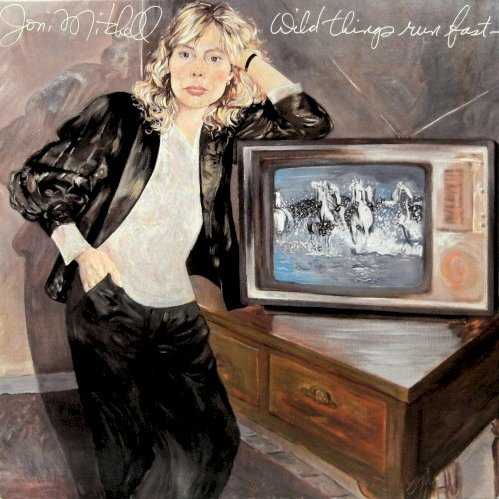 | Album: 13 of 33 Title: Wild Things Run Fast Released: 1982-10 Tracks: 11 Duration: 36:42 Scroll: Up Down Top Bottom 25% 50% 75% Spotify Allmusic Wikipedia AlbumCover | 1 Chinese Café / Unchained Melody (05:18) 2 Wild Things Run Fast (02:16) 3 Ladies’ Man (02:40) 4 Moon at the Window (03:44) 5 Solid Love (03:05) 6 Be Cool (04:13) 7 (You’re So Square) Baby, I Don’t Care (02:37) 8 You Dream Flat Tires (02:53) 9 Man to Man (03:45) 10 Underneath the Streetlight (02:17) 11 Love (03:48) |
| Wild Things Run Fast : Allmusic album Review : On her first new studio album of original material in five years and her debut for Geffen Records, Joni Mitchell achieved more of a balance between her pop abilities and her jazz aspirations, meanwhile rediscovering a more direct, emotional lyric approach. The result was her best album since the mid-70s. | ||
 | Album: 14 of 33 Title: Dog Eat Dog Released: 1985-10 Tracks: 11 Duration: 47:47 Scroll: Up Down Top Bottom 25% 50% 75% Spotify Wikipedia Allmusic AlbumCover | 1 Good Friends (04:29) 2 Fiction (04:10) 3 The Three Great Stimulants (06:11) 4 Tax Free (04:17) 5 Smokin (Empty, Try Another) (01:46) 6 Dog Eat Dog (04:44) 7 Shiny Toys (03:28) 8 Ethiopia (05:51) 9 Impossible Dreamer (04:30) 10 Lucky Girl (04:16) 11 Good Friends (demo) (04:02) |
| Dog Eat Dog : Allmusic album Review : Joni Mitchell here turned to guests like Michael McDonald, Thomas Dolby, Don Henley, James Taylor, and Wayne Shorter, continuing to straddle the worlds of California folk/pop and jazz fusion. Musically, it worked, although as a lyricist, Mitchell again took off after abstractions (one song railed against "The three great stimulants of the exhausted ones/Artifice, brutality and innocence"), such that, even when you could figure out what she was talking about, you didnt care. | ||
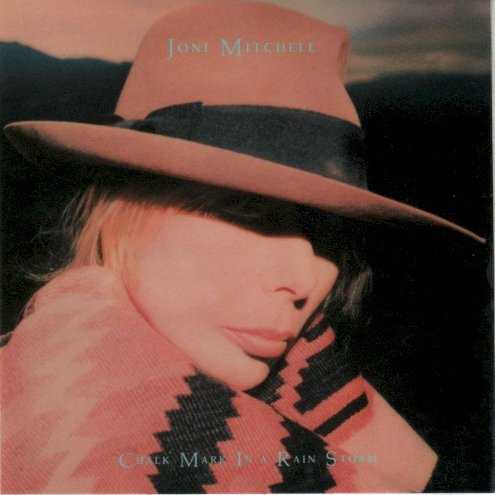 | Album: 15 of 33 Title: Chalk Mark in a Rain Storm Released: 1988 Tracks: 10 Duration: 46:24 Scroll: Up Down Top Bottom 25% 50% 75% Spotify Allmusic AlbumCover | 1 My Secret Place (05:03) 2 Number One (03:48) 3 Lakota (06:27) 4 The Tea Leaf Prophecy (Lay Down Your Arms) (04:54) 5 Dancin Clown (03:53) 6 Cool Water (05:26) 7 The Beat of Black Wings (05:25) 8 Snakes and Ladders (05:44) 9 The Reoccurring Dream (03:04) 10 A Bird That Whistles (02:36) |
| Chalk Mark in a Rain Storm : Allmusic album Review : Long before Frank Sinatra made his Duets album, Joni Mitchell cast a variety of name singers in prominent roles for the songs on Chalk Mark in a Rainstorm. Peter Gabriel sings with her on the leadoff track, "My Secret Place," and Don Henley is heard on "Lakota" and "Snakes and Ladders," Billy Idol and Tom Petty have roles in "Dancin Clown," and Willie Nelson brings his dry phrasing to "Cool Water," while ex-Cars singer Benjamin Orr and ex-Prince associates Wendy Melvoin and Lisa Coleman also have backup parts. Mitchell uses the vocal firepower over spare tracks heavy on percussion (by Manu Katche) and programming to tell stories and comment on social issues. "Lakota" deals with Native American and environmental matters, "Cool Water" (a Mitchell rewrite of the Bob Nolan original) discusses water pollution, "The Tea Leaf Prophecy (Lay Down Your Arms)" and "The Beat of Black Wings" tell war-related tales. But Mitchells main theme, which encompasses those topics, concerns the evils of contemporary culture in which one struggles to be "Number One," rises and falls like a game of "Snakes and Ladders," and suffers "The Reoccurring Dream" brought on by advertising. Chalk Mark in a Rainstorm rarely makes these points personally enough to stir the listener, and the trendy percussion sound (popular with artists like Gabriel and Kate Bush in the 80s) is already beginning to sound dated. But the songwriting and Mitchells voice remain impressive, especially when she recalls her past with a revised version of "Corrina, Corrina" at the end. | ||
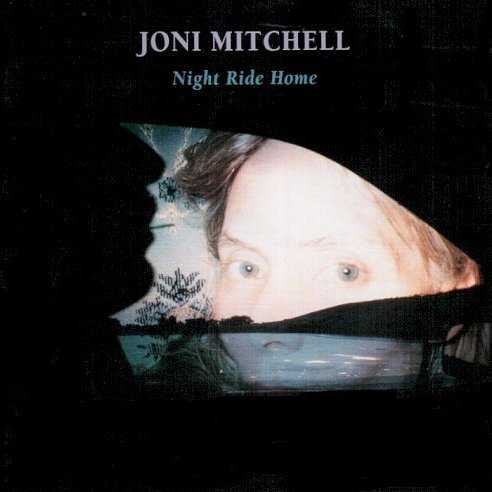 | Album: 16 of 33 Title: Night Ride Home Released: 1991-03-05 Tracks: 10 Duration: 51:41 Scroll: Up Down Top Bottom 25% 50% 75% Spotify Allmusic Wikipedia AlbumCover | 1 Night Ride Home (03:21) 2 Passion Play (When All the Slaves Are Free) (05:25) 3 Cherokee Louise (04:32) 4 The Windfall (Everything for Nothing) (05:16) 5 Slouching Towards Bethlehem (06:55) 6 Come in From the Cold (07:31) 7 Nothing Can Be Done (04:54) 8 The Only Joy in Town (05:12) 9 Rays Dads Cadillac (04:34) 10 Two Grey Rooms (03:59) |
| Night Ride Home : Allmusic album Review : Cutting back on the guest musicians of her previous effort and paring down to a basic small group of musicians helps add immediacy to Night Ride Home. While this release features several of Joni Mitchells favorites, nothing here would become a hit, as Joni tended to buck trends and follow her own beat. Very involved and a rather tough listen, but well worth the attention, this would be her last for Geffen, where she languished unnoticed while the label went heavy metal crazy. | ||
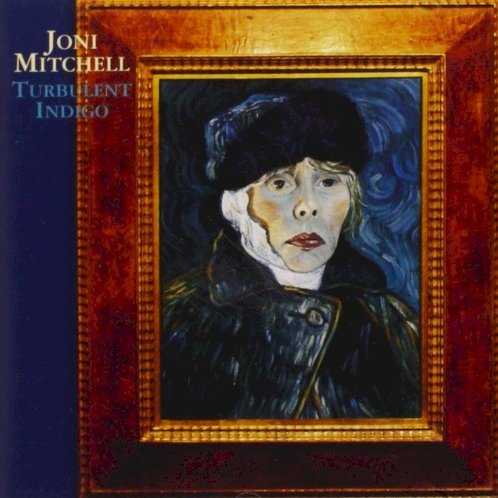 | Album: 17 of 33 Title: Turbulent Indigo Released: 1994-10-25 Tracks: 10 Duration: 43:06 Scroll: Up Down Top Bottom 25% 50% 75% Spotify Allmusic AlbumCover | 1 Sunny Sunday (02:37) 2 Sex Kills (03:56) 3 How Do You Stop (04:09) 4 Turbulent Indigo (03:34) 5 Last Chance Lost (03:14) 6 The Magdalene Laundries (04:03) 7 Not to Blame (04:18) 8 Borderline (04:48) 9 Yvette in English (05:16) 10 The Sire of Sorrow (Jobs Sad Song) (07:08) |
| Turbulent Indigo : Allmusic album Review : Joni Mitchell returned to the relatively spare style of albums like Hejira and her early folk collections on Turbulent Indigo, emphasizing her acoustic guitar strumming and singing on a series of songs that detail the political and social discontent she had previously explored on Dog Eat Dog and Chalk Mark in a Rain Storm. In the brief opener, "Sunny Sunday," a woman tries to shoot out a streetlight with a pistol and misses every night, a metaphor for the individuals futile struggle against civilization, and Mitchell repeats much the same message in songs like "Sex Kills," a generalized criticism of everything from lawyers to the hole in the ozone layer; "Turbulent Indigo," which describes the inability of people to understand artists; "Last Chance Lost," which treats romantic disappointment; and "Not to Blame," about spousal abuse. The low-key music and restrained vocals stand in contrast to the lyrics -- over and over, Mitchells imagery refers to guns and violence. Turbulent Indigo provides a disturbing view of modern life made all the more compelling by its calm presentation. | ||
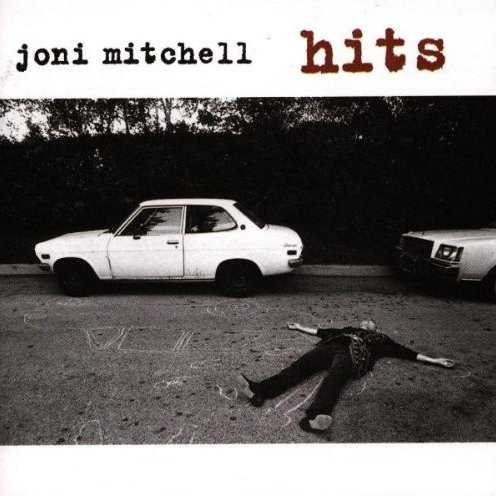 | Album: 18 of 33 Title: Hits Released: 1996 Tracks: 15 Duration: 1:00:50 Scroll: Up Down Top Bottom 25% 50% 75% Spotify Allmusic Wikipedia AlbumCover | 1 Urge for Going (05:06) 2 Chelsea Morning (02:35) 3 Big Yellow Taxi (02:15) 4 Woodstock (05:28) 5 The Circle Game (04:52) 6 Carey (03:03) 7 California (03:50) 8 You Turn Me on Im a Radio (02:39) 9 Raised on Robbery (03:06) 10 Help Me (03:22) 11 Free Man in Paris (03:02) 12 River (04:05) 13 Chinese Café / Unchained Melody (05:18) 14 Come in From the Cold (07:31) 15 Both Sides, Now (04:34) |
| Hits : Allmusic album Review : The album is a long overdue anthology of one of Canadas most celebrated ex-pats, Joni Mitchell. She sanctioned the release only on the condition that she be allowed to compile companion album Misses. While the 15-strong Hits focuses on her earlier folk-pop crossover successes, many made famous initially by others ("Both Sides Now," "Woodstock," "The Circle Game"), Misses is a personal cross section of her more challenging early material and more recent recordings -- the riveting "The Wolf That Lives in Lindsey" from Mingus is especially enlightening. One should not pick up one disc without the other. With the flood of box sets released in recent years for far less deserving artists, its odd that Reprise didnt go all out and make this a more elaborate tribute. | ||
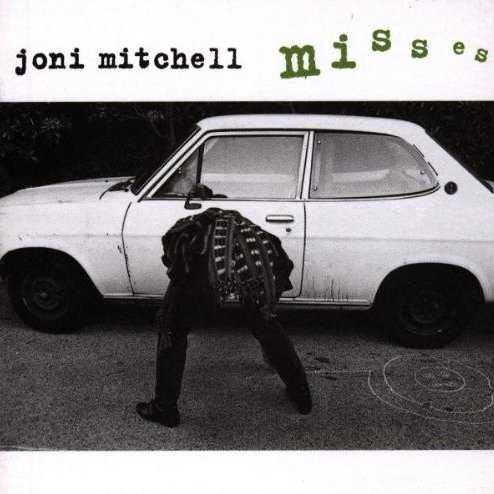 | Album: 19 of 33 Title: Misses Released: 1996-10-29 Tracks: 14 Duration: 1:07:51 Scroll: Up Down Top Bottom 25% 50% 75% Spotify Allmusic Wikipedia AlbumCover | 1 Passion Play (When All the Slaves Are Free) (05:25) 2 Nothing Can Be Done (04:51) 3 A Case of You (04:23) 4 The Beat of Black Wings (05:25) 5 Dog Eat Dog (04:42) 6 The Wolf That Lives in Lindsey (06:33) 7 The Magdalene Laundries (04:04) 8 Impossible Dreamer (04:31) 9 Sex Kills (03:56) 10 The Reoccurring Dream (03:05) 11 Harrys House / Centerpiece (06:48) 12 The Arrangement (03:34) 13 For the Roses (03:48) 14 Hejira (06:42) |
| Misses : Allmusic album Review : Misses intends to round up the best of Joni Mitchells failed singles and forgotten album tracks, which is a daunting task, to be sure. In a career as acclaimed, idiosyncratic, and prolific as Mitchells, its problematic to boil all the forgotten favorites down to one disc, but the task is made all the more difficult by the fact that the songwriter herself compiled the collection and has an agenda. Mitchell is out to prove that her neglected Geffen recordings during the 80s were as consistent as her classic 70s albums for Reprise. Although she is correct in her assessment that the albums should be given more respect, her execution could have been better. The bulk of Misses is comprised of the Geffen recordings, which were frequently difficult to appreciate, and in this presentation, they arent any easier to digest. "A Case of You," which probably should have been on Hits, is added as bait, but casual fans of that song wont find the rest of Misses as illuminating as Blue. In fact, only the converted will be willing to make an effort with the bulk of Misses, and theyll probably find the individual albums more rewarding. So, the record doesnt appeal to its intended audience, leaving it without one | ||
 | Album: 20 of 33 Title: Taming the Tiger Released: 1998-09-28 Tracks: 11 Duration: 44:17 Scroll: Up Down Top Bottom 25% 50% 75% Spotify Allmusic Wikipedia AlbumCover | 1 Harlem in Havana (04:27) 2 Man From Mars (04:09) 3 Love Puts on a New Face (03:46) 4 Lead Balloon (03:37) 5 No Apologies (04:17) 6 Taming the Tiger (04:17) 7 The Crazy Cries of Love (03:54) 8 Stay in Touch (02:58) 9 Face Lift (04:41) 10 My Best to You (03:42) 11 Tiger Bones (04:23) |
| Taming the Tiger : Allmusic album Review : This 1998 disc from Joni Mitchell harks back to the days when she heard the hissing of summer lawns and the jazzier essays of her Hejira days. The only difference between then and now is her use of a guitar synthesizer for her aural textures and melody templates. Always employing the best of musicians to help her out, Mitchell takes off on a trip through "Harlem in Havana" and ending up with "Tiger Bones" to show for it. Along the way, she puts forth "No Apologies" and rocks things up with "Lead Balloon" (which will remind one of "Big Yellow Taxi"), and contains one of her best opening one-liners ever. With "Taming the Tiger" dedicated to her newfound daughter and grandson, "Stay in Touch" could be about them, or almost anyone Mitchells been close to. Either way, its a great tune. Taming the Tiger is her most pleasing and consistent disc since the mid-70s; even after all these years, Joni Mitchell continues to expand her music while keeping her integrity intact. This is definitely one of her best. | ||
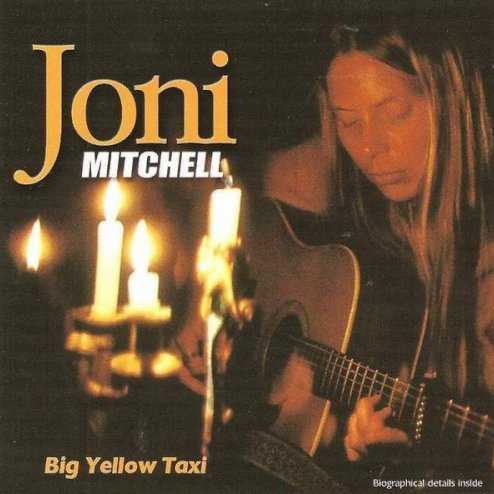 | Album: 21 of 33 Title: Big Yellow Taxi Released: 1999 Tracks: 12 Duration: 44:49 Scroll: Up Down Top Bottom 25% 50% 75% Spotify AlbumCover | 1 Rainy Night House (03:24) 2 The Priest (03:40) 3 Blue Boy (02:54) 4 Big Yellow Taxi (02:15) 5 Woodstock (05:28) 6 The Circle Game (04:52) 7 Morning Morgantown (03:13) 8 For Free (04:31) 9 Conversation (04:21) 10 Ladies of the Canyon (03:32) 11 Willy (03:00) 12 The Arrangement (03:34) |
 | Album: 22 of 33 Title: Both Sides Now Released: 2000-02-28 Tracks: 12 Duration: 51:35 Scroll: Up Down Top Bottom 25% 50% 75% Spotify Wikipedia Allmusic AlbumCover | 1 You’re My Thrill (03:53) 2 At Last (04:27) 3 Comes Love (04:29) 4 You’ve Changed (05:00) 5 Answer Me, My Love (03:23) 6 A Case of You (05:53) 7 Don’t Go to Strangers (04:10) 8 Sometimes Im Happy (03:58) 9 Don’t Worry Bout Me (03:49) 10 Stormy Weather (03:06) 11 I Wish I Were in Love Again (03:36) 12 Both Sides Now (05:46) |
| Both Sides Now : Allmusic album Review : Ex-husband Larry Klein, who serves as co-producer and musical director, explains in his liner notes that Joni Mitchell intended to tell the story of a "modern" romantic relationship in the songs, most of which come from the 30s and 40s. If so, her concept of a modern relationship is very troubled -- most of the selections are unhappy love songs. Vince Mendozas arrangements -- a third of them played by a gigantic 71-piece orchestra, a third by a regular-size orchestra, and a third by a swing-style big band -- often suggest the oceanic sweep and serious, melancholy tone of film noir movie music. They also do a lot of Mitchells work for her. As a singer, she has never had much projection or power, but she is a master of phrasing and tone. Mitchell often sounds like an alternate Billie Holiday, with the breathiness and note decay characteristic of later Holiday, if none of her delayed timing. Both Sides Now is not revelatory in a musical sense, but it does achieve its intention of reconceiving Joni Mitchell as an interpretive singer. | ||
 | Album: 23 of 33 Title: Travelogue Released: 2002-11-19 Tracks: 11 Duration: 1:04:41 Scroll: Up Down Top Bottom 25% 50% 75% Spotify Allmusic Wikipedia AlbumCover | 1 Be Cool (05:10) 2 Just Like This Train (05:04) 3 Sex Kills (03:57) 4 Refuge of the Roads (07:57) 5 Hejira (06:49) 6 Chinese Café / Unchained Melody (05:43) 7 Cherokee Louise (06:02) 8 The Dawntreader (05:40) 9 The Last Time I Saw Richard (04:59) 10 Borderline (06:25) 11 The Circle Game (06:50) |
| Travelogue : Allmusic album Review : According to Joni Mitchell, Travelogue is her final recorded work, and if that is so, its a detailed exploration of moments in a career that is as dazzling as it is literally uncompromising. Over 22 tracks and two CDs (and as stunning package featuring a plethora of photographs of Mitchells paintings), Travelogue is a textured and poetic reminiscence, not a reappraisal, of her work -- most of it from the 1970s through the 1990s. A 70-piece orchestra, as well as jazz legends Herbie Hancock, Wayne Shorter, and Kenny Wheeler, drummer Brian Blade, bassist Chuck Berghofer, producer Larry Klein, and organist Billy Preston, among others, accompanies her. Its true that Mitchell dabbled in this territory in 2000 on Both Sides Now, but that recording only remotely resembles this one. Cast in this way it is true that this is no easy cruise, but given the nearly 40 years of her sojourn in popular music, Mitchells work, particularly from the mid-70s on, has been difficult for many to grasp on first listen and always gives up its considerable rewards, slowly making her records age well over time; they are not disposable as much of the music from her peers is. These completely recast songs cover the entirety of her career, from her debut, Song From a Seagull, to Turbulent Indigo (with certain albums not being represented at all). Its true there arent high-profile cuts here except for "Woodstock," which is radically reshaped, but it hardly matters. When you hear the ultrahip, be-bopping "God Must Be a Boogie Man," there is an elation without sentimentality; in the scathing and venomous "For the Roses" and "Just Like This Train," the bitterness and aggression in their delivery offers the listener an empathy with Mitchells anger at the recording industry -- and anyone else whos crossed her. But while there is plenty of swirling darkness amid the strings here, there is also the fulfillment of prophecy; just give a listen to this version of "Sex Kills" that bears its weight in full measure of responsibility and vision. Her voice, aged by years of smoking, is huskier and is, if anything, more lovely, mature, deep in its own element of strength. The restatement of W.B. Yeats, "Slouching Toward Bethlehem," is more stunning now than ever before as is "Hejira." In "The Circle Game" and "Slouching Toward Bethlehem," you hear the ambition in Mitchells musical direct as she has moved ever closer to the tone poem as a song form. Though it may not be as easy on first listen as Court and Spark, Travelogue will continue to unfold over time and offer, like her best work, decades of mystery and pleasure. | ||
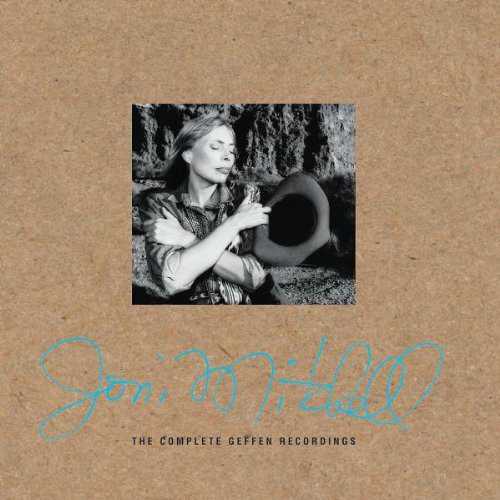 | Album: 24 of 33 Title: The Complete Geffen Recordings Released: 2003-09-23 Tracks: 44 Duration: 3:11:38 Scroll: Up Down Top Bottom 25% 50% 75% Spotify Allmusic AlbumCover | 1 Chinese Café / Unchained Melody (05:18) 2 Wild Things Run Fast (02:16) 3 Ladies’ Man (02:40) 4 Moon at the Window (03:44) 5 Solid Love (03:05) 6 Be Cool (04:12) 7 (You’re So Square) Baby, I Don’t Care (02:37) 8 You Dream Flat Tires (02:52) 9 Man to Man (03:45) 10 Underneath the Streetlight (02:17) 11 Love (04:04) 12 Two Grey Rooms (demo) (03:57) 1 Good Friends (04:29) 2 Fiction (04:10) 3 The Three Great Stimulants (06:14) 4 Tax Free (04:17) 5 Smokin (Empty, Try Another) (01:45) 6 Dog Eat Dog (04:44) 7 Shiny Toys (03:28) 8 Ethiopia (05:51) 9 Impossible Dreamer (04:31) 10 Lucky Girl (04:16) 11 Good Friends (demo) (04:03) 1 My Secret Place (05:02) 2 Number One (03:48) 3 Lakota (06:25) 4 The Tea Leaf Prophecy (Lay Down Your Arms) (04:54) 5 Dancin Clown (03:55) 6 Cool Water (05:26) 7 The Beat of Black Wings (05:25) 8 Snakes and Ladders (05:44) 9 The Reoccuring Dream (03:05) 10 A Bird That Whistles (02:37) 1 Night Ride Home (03:21) 2 Passion Play (When All the Slaves Are Free) (05:25) 3 Cherokee Louise (04:32) 4 The Windfall (Everything for Nothing) (05:16) 5 Slouching Towards Bethlehem (06:54) 6 Come in From the Cold (07:31) 7 Nothing Can Be Done (04:54) 8 The Only Joy in Town (05:12) 9 Rays Dads Cadillac (04:33) 10 Two Grey Rooms (04:14) 11 Its All Over Now Baby Blue (demo) (04:41) |
| The Complete Geffen Recordings : Allmusic album Review : For starters, hunters should not get their hopes up about any unreleased material on this box set -- there are exactly three cuts, two are unfinished demo versions of songs already on their respective albums -- "Two Grey Rooms" and "Good Friends" -- as well as an unreleased cover version of Dylans "Its All Over Now Baby Blue." But thats fine, just fine. The bottom line is that these records havent been available in some time due to the profound folly of the accountants who run the Geffen imprint who wouldnt know art if it were hanging in their living rooms. The box is stunning, gorgeous even in its earth-tone glory with a brilliant inset photograph by former husband and producer Larry Klein. There are poignant photos, the albums in their original sleeves, a completely searing unapologetic set of liner notes from Mitchell, reproductions of paintings, and more. Mitchells comments, which introduce many of the songs here, are priceless. These and the liner notes are almost worth the price of the box. The only design problem seems to be that the booklet falls apart a bit from its stitching, but thats not really a big deal. However, there is the music to contend with. When Mitchell entered the 80s with Wild Things Run Fast, her first studio album of the decade coming off the Mingus and the transcendent Shadows And Light tour. Lyrically, Mitchell met the challenge head on, and musically, she did as she always did: followed her own Muse deeper into the realms of jazz and classic American pop. She collaborated with Larry Klein for the first time -- as she has ever since -- and began using small core bands with Kleins bass as an anchor and numerous guests including Wayne Shorter, Lionel Ritchie, Brenda Russell, Alex Acuña; even Grasshopper from Mercury Rev made an appearance on Night Ride Home. On this box it becomes obvious that Wild Things Run Fast set a template for four very different, yet linked, recordings. With its jazzy edges and its liberal use of early rock and roll and classic R&B; (at one point in "Chinese Laundry" Mitchell does a very moving rendition of "Unchained Melody," and at another covers Leiber and Stollers "Youre So Square"). Critics were downright hostile to Dog Eat Dog, from the cover on in to the music. Given its dark meditations on the era, its use of Thomas Dolby and technology, it flew in the face of 80s-styled simple, shiny rock, and took to task both the rampant materialism of the age, and its complete abandonment of human concerns for commerce and cultural iconography. It also laughed at the forced simplicity of popular music at the time with a rampant sophistication and cool. Chalk Mark In A Rain Storm, with its Native American themes and mystical jazz tropes, is simply a brilliant recording that was received with kindness, and even some understanding by critics, but it sold miserably even though its guests reflected a whos who of the MTV era: Peter Gabriel, Billy Idol, Don Henley, Tom Petty, and Wendy and Lisa (from Princes band). Night Ride Home garnered decent reviews as well; it featured a stripped down, more acoustic sound, and is one of the most lyrically brilliant and ambitious of Mitchells many albums. Here was a long reflection on endings, dark ambiguities, and the willingness to stay inside a place that offers no certainty in order to live ones way into an answer. Tracks like "The Windfall," "Slouching Toward Bethlehem," "Cherokee Louise," and "Come In From The Cold," offer a vision of steadfastness in dark and wavering trials of the soul. Her version of Dylans "Baby Blue" here is a real bonus; its a revelatory reading of a monolithic song. Revealing her to still be full of the tricksters promise and the visionarys unwavering gaze into the future, this is a box set worthy of Mitchells contribution. | ||
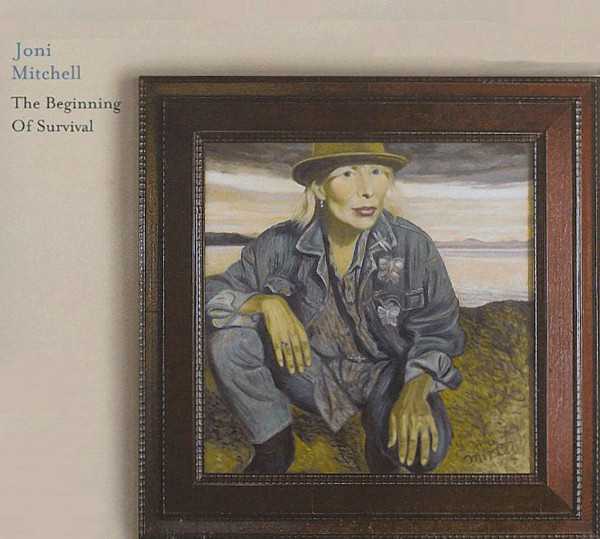 | Album: 25 of 33 Title: Beginning of Survival Released: 2004-07-27 Tracks: 16 Duration: 1:19:06 Scroll: Up Down Top Bottom 25% 50% 75% Spotify Wikipedia AlbumCover | 1 The Reocurring Dream (03:03) 2 The Windfall (Everything for Nothing) (05:09) 3 Slouching Towards Bethlehem (06:49) 4 Dog Eat Dog (04:27) 5 Fiction (04:10) 6 The Beat of Black Wings (05:25) 7 No Apologies (04:17) 8 Sex Kills (03:56) 9 The Three Great Stimulants (06:06) 10 Lakota (06:25) 11 Ethiopia (05:38) 12 Cool Water (05:25) 13 Tax Free (04:17) 14 The Magdalene Laundries (04:03) 15 Passion Play (The Story of Jesus and Zachius... The Little Tax Collector) (05:19) 16 Impossible Dreamer (04:31) |
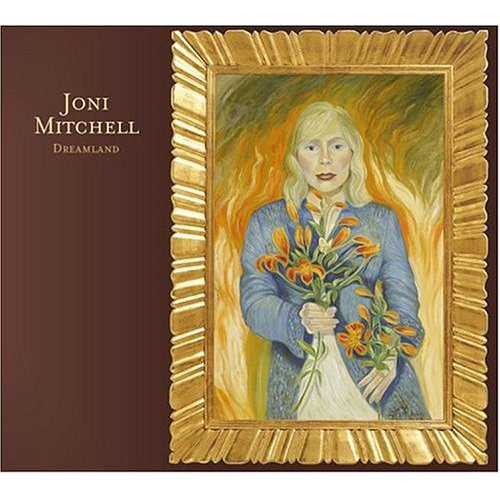 | Album: 26 of 33 Title: Dreamland Released: 2004-09-14 Tracks: 17 Duration: 1:16:54 Scroll: Up Down Top Bottom 25% 50% 75% Spotify Allmusic Wikipedia AlbumCover | 1 Free Man in Paris (03:02) 2 In France They Kiss on Main Street (03:19) 3 Dreamland (04:39) 4 The Jungle Line (04:26) 5 Furry Sings the Blues (05:06) 6 You Turn Me on Im a Radio (02:39) 7 Carey (03:03) 8 Big Yellow Taxi (02:15) 9 California (03:50) 10 Help Me (03:22) 11 Nothing Can Be Done (04:51) 12 Dancin Clown (03:51) 13 Come in From the Cold (07:31) 14 Amelia (Orchestral Version 2002) (06:46) 15 For the Roses (07:29) 16 Both Sides Now (Orchestral Version 2000) (05:46) 17 The Circle Game (04:52) |
| Dreamland : Allmusic album Review : Dreamland is the second volume in Joni Mitchells self-compiled series of "theme" retrospectives. The first, issued on the Geffen label, was entitled The Beginning of Survival. It focused on songs that dug deep into social, cultural, political, and environmental themes, as "commentaries on the world in which we live." Dreamland was compiled from her Asylum, Reprise, and Nonesuch years and focuses, for lack of a better term, on the jazzier side of her catalog musically, including songs with lyrics are all highly imagistic in their makeup. Most are dealing with love and life in the process of moving through it. From "Free Man in Paris" and the title track, to "In France They Kiss on Main Street," "Come in From the Cold," "Help Me," and of course, "You Turn Me on Im a Radio," these songs turn the tide for the listener from the place of observing love to the terrain of being caught up in it, where everything is hyperreal and the senses are heightened. The other, tempered side of love is offered with the orchestral version of "Both Sides Now" and "For the Roses." But there are other songs, too, like "Furry Sings the Blues," which paints a nocturnal landscape of the blues past, as visited by the protagonist in dreaming, or travel as an other reality in the orchestral reading of "Amelia," or in "California." In each instance, the view of reality presented is distorted, either by memory, the acute hypersensitivity of the heart, or by the notion of displacement. All of these strains weave a new terrain from Mitchells oeuvre. The package is, once again, a delight, featuring a fine appreciation by Cameron Crowe, and reproductions of ten of Mitchells paintings. While the material here has all been released before, as has always been the case with Mitchells work, context is everything. This bold new context offers a startling view of the artist as auteur. | ||
 | Album: 27 of 33 Title: Songs of a Prairie Girl Released: 2005-04-26 Tracks: 13 Duration: 1:16:45 Scroll: Up Down Top Bottom 25% 50% 75% Spotify Allmusic Wikipedia AlbumCover | 1 Urge for Going (05:06) 2 The Tea Leaf Prophecy (Lay Down Your Arms) (04:54) 3 Cherokee Louise (Orchestral Version, 2002) (06:01) 4 Rays Dads Cadillac (04:33) 5 Let the Wind Carry Me (03:56) 6 Don Juans Reckless Daughter (06:36) 7 Raised on Robbery (03:06) 8 Paprika Plains (remix) (16:19) 9 Song for Sharon (08:40) 10 River (04:05) 11 Chinese Café / Unchained Melody (05:18) 12 Harlem in Havana (04:27) 13 Come in From the Cold (edit) (03:38) |
| Songs of a Prairie Girl : Allmusic album Review : The third in Joni Mitchells ongoing series of thematic compilations drawn from her stellar back catalog, Songs of a Prairie Girl is described by Mitchell in her liner notes as "my contribution to Saskatchewans Centennial celebrations," an appropriate gesture since she spent most of her childhood in Saskatoon, a city in that Canadian province. Most of the songs on Songs of a Prairie Girl deal in one way or another with childhood or adolescence, often with a bittersweet edge; theres little in the way of unbridled nostalgia, with "Let the Wind Carry Me" and "Urge for Going" expressing the desire to escape the boundaries of small-town life, and "Rays Dads Cadillac" and "Song for Sharon" recalling equal measures of joy and remorse in the misadventures of her teen years. Mitchells music also splendidly conjures up the wintry space of the Canadian plains, especially on the epic "Paprika Plains" from Don Juans Reckless Daughter (appearing here in a new mix that reduces the emphasis on the orchestra in favor of Jonis piano) and the symphonic version of "Cherokee Louise." And while there are moments of remembered joy (particularly on "Harlem in Havana"), for the most part Songs of a Prairie Girl is, by design, a meditation on the broad and snowy spaces of Saskatchewan, and Mitchell herself advises with tongue in cheek that the listeners should "get yourself a hot beverage and stand by the heater as you listen." As a collection of lesser-known material ("Raised on Robbery" is the only "hit" here), Songs of a Prairie Girl once again casts a well-considered glance on a less-explored aspect of Mitchells work, and these songs convey the mingled pleasure and sadness of growing up with the careful eye of a true artist, as well as the crisp if faded memories of the home she left so many years ago. Beautiful stuff, and richly rewarding. | ||
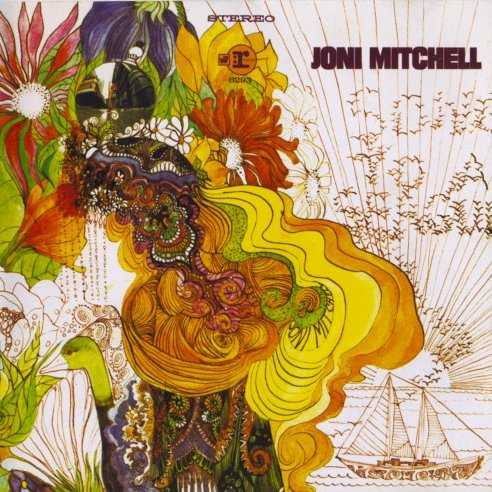 | Album: 28 of 33 Title: Joni Mitchell Released: 2006 Tracks: 10 Duration: 39:26 Scroll: Up Down Top Bottom 25% 50% 75% Spotify AlbumCover | 1 I Had A King (03:30) 2 Michael From Mountains (03:38) 3 Night In The City (04:35) 4 Marcie (04:35) 5 Nathan La Franeer (03:13) 6 Sisotowbell Lane (04:00) 7 The Dawntreader (04:50) 8 The Pirate Of Penance (02:40) 9 Song To A Seagull (03:50) 10 Cactus Tree (04:35) |
![Allmusic album Review : Shine, recorded and released in 2007, is the sign from the heavens that Joni Mitchell has come out of retirement. She left in the early part of the century, railing against a music industry that only cared about "golf and rappers," accusing it of virtually every artistic crime under the sun. So the irony that she signed to Hear Music, Starbucks music imprint, is pronounced. The company has been embroiled in controversy over its labor and trade practices, and has been accused of union-busting and spying on its employees and union members. Its especially ironic given the nature of the music on this set, which is political, environmental, and social in its commentary. Hear Music has also issued recordings by Paul McCartney and Bob Dylan, so shes in great company. But its music that were after here, and Mitchell doesnt disappoint on this score. She doesnt have the same reach vocally that she used to. A lifetime of cigarette smoking will do that to you. But given the deeply reflective and uncomfortably contemplative nature of some of these songs, it hardly matters. Mitchell produced this set herself, and with the exception of guest performances -- saxophones by Bob Sheppard, steel guitar by Greg Leisz, some drum spots by Brian Blade, and bass by Larry Klein, all selectively featured -- Mitchell plays piano, guitar, and does all the other instrumentation and arrangements herself. The drum machine she uses is so antiquated that its corny, but its also charming in the way she employs it. The songs carry the same weight they always have. Her off-kilter acoustic guitar playing is as rhythmically complex as ever, and her commentary is biting, sardonic, and poetic.<br><br> The set begins with a five-minute instrumental that would be perfect to accompany the images of the ballet dancers on the cover. "This Place," where her acoustic guitar, a synth, and the pedal steel are kissed by Sheppards soprano saxophone, follows it. Its a statement of place, and the knowledge that its natural beauty is heavenly, but will not remain that way: "You see those lovely hills/They wont be there for long/Theyre gonna tear em down/And sell em to California...when this place looks like a moonscape/Dont say I didnt warn ya." She ends it with a prayer for the "courage and the grace/To make genius of this tragedy/The genius to save this place." Its hardly the standard pontificating of rock stars. Thank God. The next tune, "If I Had a Heart," with Blade, Klein, and Leisz, offers this confession: "Holy war/Genocide/Suicide/Hate and cruelty...How can this be holy?/If I had a heart, Id cry." Its the acceptance of the dehumanization of the culture as well as the increasing uninhabitability of the planet, this resignation thats so startling even as these melodies take you to the places in Mitchells songwriting weve always loved. The massive drum loops, didgeridoo samples, and bass throbs -- with additional percussion by Paulinho da Costa -- is a story-song that is meant to be a backbone, hands dirty working and improving things. Its haunting, as it hovers inside its groove with startling electric guitar distortion and effects.<br><br> But only two songs later we move to "Big Yellow Taxi [2007 Version]." Its radically revisioned and reshaped. Its full of darker tones, soundscapes, an accordion sample, and a tougher acoustic guitar strum. What used to be a hummable if biting indictment of the powers that be, who wanted to develop every last inch of natural space, has become a self-fulfilling prophecy. The exhortation to farmers is still there, but its more a bitter reminder of the refrain. Its the only song here, and followed by the most beautiful cut on the entire set in "Night of the Iguana," a big, elegant, polyrhythmic allegory that features some of the greatest guitar playing Mitchell has ever done -- those leads actually sear, though she employs them as Brian Eno would. In this tune, the storyteller is at the height of her powers, examining the contradictions in being human in a morality tale. With her poetic powers at a peak, she sings, "The jasmine is so mercilessly sweet/Night of the iguana/Can you hear the castanets?/Its the widow and her lover boys/Down on the beach." She suspends all judgment of the protagonist. She merely lets it all come in and sort itself out. "Strong and Wrong" reasserts with Blade, Leisz, and Mitchells beautifully articulate piano and warm, watery sonic textural backdrops, with her feminism coming through, expressing that the story of war is because men love it and thats what history is for: "a mass-murder mystery/His story." Right. Chrissie Hynde and Madonna may have trouble with Mitchells old-school feminism, her politics, and her view, although she indicts not only men but all of us for "still worshipping/Our own ego."<br><br>Shine is an unsettling album, full of lean, articulate statements that are not meant to make you feel good. She doesnt have to finger-wag like Bono, who foolishly tries to use the power of guilt on the people hes playing with -- theyve been at this game for far longer and seen it all -- or Thom Yorkes own contemptuous anguish that pleads as much as it professes. Mitchell doesnt have to do anything but lay it down in song, play the generalities and ambiguities as part and parcel of human existence as it has "evolved" and wandered off the path to paradise, through the seduction of power and money. Shes an artist; its her job to report what she sees. "Shine," a relatively simple, mantra-like song, is the other side of the coin and provides that glimmer of Beckett-ian hope we need more than she does, but it seems shes holding out for it, too. Its hunger. Musically its imaginative, fresh, full of a more studied elegance and a leaner kind of pomp that we heard during her Geffen years (a period of her career thats still criminally underappreciated). In addition to her truly iconoclastic songwriting ability, she has proved herself to be a worthy producer of her own work. Shes picked up tips from many others from Klein to Daniel Lanois to Jon Brion, and by employing excess at all the seemingly wrong moments, while stripping away the drama from her truly forceful lines and letting them hang out there nearly naked, she offers a view inside her music that we havent heard before but still sounds familiar. Shine isnt a coffee-table record. Its an intuitive one; it wont attract record execs looking for the next fading star to resurrect. Mitchell doesnt need them, because there is little to resurrect in the life of a singular artist, especially this one. Her spirit is as unbowed, aesthetically curious, and restless as it has ever been -- thankfully. shine](../../images/joni_mitchell-shine.jpg) | Album: 29 of 33 Title: Shine Released: 2007-09-24 Tracks: 10 Duration: 46:56 Scroll: Up Down Top Bottom 25% 50% 75% Spotify Allmusic Wikipedia AlbumCover | 1 One Week Last Summer (04:59) 2 This Place (03:54) 3 If I Had a Heart (04:04) 4 Hana (03:43) 5 Bad Dreams (05:41) 6 Big Yellow Taxi (2007) (02:47) 7 Night of the Iguana (04:38) 8 Strong and Wrong (04:04) 9 Shine (07:29) 10 If (05:32) |
| Shine : Allmusic album Review : Shine, recorded and released in 2007, is the sign from the heavens that Joni Mitchell has come out of retirement. She left in the early part of the century, railing against a music industry that only cared about "golf and rappers," accusing it of virtually every artistic crime under the sun. So the irony that she signed to Hear Music, Starbucks music imprint, is pronounced. The company has been embroiled in controversy over its labor and trade practices, and has been accused of union-busting and spying on its employees and union members. Its especially ironic given the nature of the music on this set, which is political, environmental, and social in its commentary. Hear Music has also issued recordings by Paul McCartney and Bob Dylan, so shes in great company. But its music that were after here, and Mitchell doesnt disappoint on this score. She doesnt have the same reach vocally that she used to. A lifetime of cigarette smoking will do that to you. But given the deeply reflective and uncomfortably contemplative nature of some of these songs, it hardly matters. Mitchell produced this set herself, and with the exception of guest performances -- saxophones by Bob Sheppard, steel guitar by Greg Leisz, some drum spots by Brian Blade, and bass by Larry Klein, all selectively featured -- Mitchell plays piano, guitar, and does all the other instrumentation and arrangements herself. The drum machine she uses is so antiquated that its corny, but its also charming in the way she employs it. The songs carry the same weight they always have. Her off-kilter acoustic guitar playing is as rhythmically complex as ever, and her commentary is biting, sardonic, and poetic. The set begins with a five-minute instrumental that would be perfect to accompany the images of the ballet dancers on the cover. "This Place," where her acoustic guitar, a synth, and the pedal steel are kissed by Sheppards soprano saxophone, follows it. Its a statement of place, and the knowledge that its natural beauty is heavenly, but will not remain that way: "You see those lovely hills/They wont be there for long/Theyre gonna tear em down/And sell em to California...when this place looks like a moonscape/Dont say I didnt warn ya." She ends it with a prayer for the "courage and the grace/To make genius of this tragedy/The genius to save this place." Its hardly the standard pontificating of rock stars. Thank God. The next tune, "If I Had a Heart," with Blade, Klein, and Leisz, offers this confession: "Holy war/Genocide/Suicide/Hate and cruelty...How can this be holy?/If I had a heart, Id cry." Its the acceptance of the dehumanization of the culture as well as the increasing uninhabitability of the planet, this resignation thats so startling even as these melodies take you to the places in Mitchells songwriting weve always loved. The massive drum loops, didgeridoo samples, and bass throbs -- with additional percussion by Paulinho da Costa -- is a story-song that is meant to be a backbone, hands dirty working and improving things. Its haunting, as it hovers inside its groove with startling electric guitar distortion and effects. But only two songs later we move to "Big Yellow Taxi [2007 Version]." Its radically revisioned and reshaped. Its full of darker tones, soundscapes, an accordion sample, and a tougher acoustic guitar strum. What used to be a hummable if biting indictment of the powers that be, who wanted to develop every last inch of natural space, has become a self-fulfilling prophecy. The exhortation to farmers is still there, but its more a bitter reminder of the refrain. Its the only song here, and followed by the most beautiful cut on the entire set in "Night of the Iguana," a big, elegant, polyrhythmic allegory that features some of the greatest guitar playing Mitchell has ever done -- those leads actually sear, though she employs them as Brian Eno would. In this tune, the storyteller is at the height of her powers, examining the contradictions in being human in a morality tale. With her poetic powers at a peak, she sings, "The jasmine is so mercilessly sweet/Night of the iguana/Can you hear the castanets?/Its the widow and her lover boys/Down on the beach." She suspends all judgment of the protagonist. She merely lets it all come in and sort itself out. "Strong and Wrong" reasserts with Blade, Leisz, and Mitchells beautifully articulate piano and warm, watery sonic textural backdrops, with her feminism coming through, expressing that the story of war is because men love it and thats what history is for: "a mass-murder mystery/His story." Right. Chrissie Hynde and Madonna may have trouble with Mitchells old-school feminism, her politics, and her view, although she indicts not only men but all of us for "still worshipping/Our own ego." Shine is an unsettling album, full of lean, articulate statements that are not meant to make you feel good. She doesnt have to finger-wag like Bono, who foolishly tries to use the power of guilt on the people hes playing with -- theyve been at this game for far longer and seen it all -- or Thom Yorkes own contemptuous anguish that pleads as much as it professes. Mitchell doesnt have to do anything but lay it down in song, play the generalities and ambiguities as part and parcel of human existence as it has "evolved" and wandered off the path to paradise, through the seduction of power and money. Shes an artist; its her job to report what she sees. "Shine," a relatively simple, mantra-like song, is the other side of the coin and provides that glimmer of Beckett-ian hope we need more than she does, but it seems shes holding out for it, too. Its hunger. Musically its imaginative, fresh, full of a more studied elegance and a leaner kind of pomp that we heard during her Geffen years (a period of her career thats still criminally underappreciated). In addition to her truly iconoclastic songwriting ability, she has proved herself to be a worthy producer of her own work. Shes picked up tips from many others from Klein to Daniel Lanois to Jon Brion, and by employing excess at all the seemingly wrong moments, while stripping away the drama from her truly forceful lines and letting them hang out there nearly naked, she offers a view inside her music that we havent heard before but still sounds familiar. Shine isnt a coffee-table record. Its an intuitive one; it wont attract record execs looking for the next fading star to resurrect. Mitchell doesnt need them, because there is little to resurrect in the life of a singular artist, especially this one. Her spirit is as unbowed, aesthetically curious, and restless as it has ever been -- thankfully. | ||
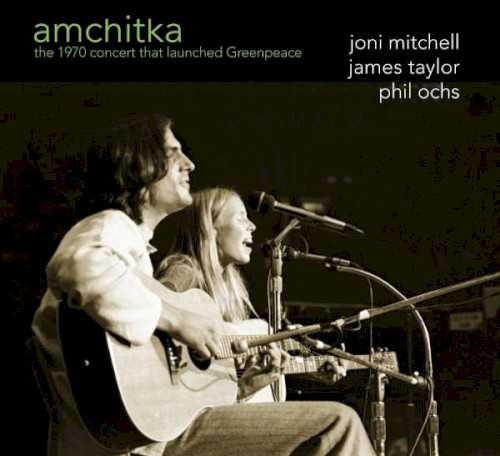 | Album: 30 of 33 Title: Amchitka: The 1970 Concert That Launched Greenpeace Released: 2009-11 Tracks: 29 Duration: 1:48:06 Scroll: Up Down Top Bottom 25% 50% 75% AlbumCover | 1 Intro Irving Stowe (01:38) 2 Intro Phil Ochs (00:10) 3 The Bells (03:25) 4 Rhythms of Revolution (04:29) 5 Chords of Fame (02:57) 6 I Aint Marching Anymore (03:06) 7 Joe Hill (07:10) 8 Changes (03:47) 9 Im Gonna Say It Now (03:02) 10 No More Songs (03:50) 11 Intro James Taylor (00:32) 12 Something in the Way She Moves (03:19) 13 Fire and Rain (03:54) 14 Carolina in My Mind (04:38) 15 Blossom (02:39) 16 Riding on a Railroad (03:04) 17 Sweet Baby James (03:43) 18 You Can Close Your Eyes (02:31) 1 Intro Joni Mitchell (00:17) 2 Big Yellow Taxi/Bony Maroney (04:00) 3 Cactus Tree (05:18) 4 The Gallery (04:25) 5 Hunter (02:41) 6 My Old Man (04:28) 7 For Free (05:19) 8 Woodstock (05:29) 9 Carey/Mr. Tambourine Man (10:35) 10 A Case of You (04:50) 11 The Circle Game (02:38) |
 | Album: 31 of 33 Title: The Studio Albums: 1968-1979 Released: 2013-02-12 Tracks: 105 Duration: 7:05:55 Scroll: Up Down Top Bottom 25% 50% 75% Spotify Allmusic AlbumCover | 1 I Had a King (03:37) 2 Michael From Mountains (03:41) 3 Night in the City (02:29) 4 Marcie (04:35) 5 Nathan La Franeer (03:20) 6 Sisotowbell Lane (04:04) 7 The Dawntreader (05:04) 8 The Pirate of Penance (02:44) 9 Song to a Seagull (03:51) 10 Cactus Tree (04:38) 1 Tin Angel (04:09) 2 Chelsea Morning (02:35) 3 I Dont Know Where I Stand (03:13) 4 That Song About the Midway (04:37) 5 Roses Blue (03:52) 6 The Gallery (04:12) 7 I Think I Understand (04:27) 8 Songs to Aging Children Come (03:10) 9 The Fiddle and the Drum (02:49) 10 Both Sides, Now (04:34) 1 Morning Morgantown (03:13) 2 For Free (04:31) 3 Conversation (04:26) 4 Ladies of the Canyon (03:32) 5 Willy (03:00) 6 The Arrangement (03:34) 7 Rainy Night House (03:24) 8 The Priest (03:40) 9 Blue Boy (02:54) 10 Big Yellow Taxi (02:15) 11 Woodstock (05:28) 12 The Circle Game (04:52) 1 All I Want (03:33) 2 My Old Man (03:35) 3 Little Green (03:28) 4 Carey (03:03) 5 Blue (03:04) 6 California (03:50) 7 This Flight Tonight (02:52) 8 River (04:05) 9 A Case of You (04:23) 10 The Last Time I Saw Richard (04:16) 1 Banquet (03:01) 2 Cold Blue Steel and Sweet Fire (04:17) 3 Barangrill (02:52) 4 Lesson in Survival (03:11) 5 Let the Wind Carry Me (03:56) 6 For the Roses (03:48) 7 See You Sometime (02:56) 8 Electricity (03:01) 9 You Turn Me on Im a Radio (02:39) 10 Blonde in the Bleachers (02:42) 11 Woman of Heart and Mind (02:38) 12 Judgement of the Moon and Stars (Ludwigs Tune) (05:19) 1 Court and Spark (02:46) 2 Help Me (03:22) 3 Free Man in Paris (03:02) 4 People’s Parties (02:15) 5 Same Situation (02:57) 6 Car on a Hill (03:02) 7 Down to You (05:38) 8 Just Like This Train (04:24) 9 Raised on Robbery (03:06) 10 Trouble Child (04:00) 11 Twisted (02:21) 1 In France They Kiss on Main Street (03:19) 2 The Jungle Line (04:26) 3 Edith and the Kingpin (03:37) 4 Dont Interrupt the Sorrow (04:05) 5 Shades of Scarlett Conquering (04:59) 6 The Hissing of Summer Lawns (03:01) 7 The Boho Dance (03:50) 8 Harrys House / Centerpiece (06:48) 9 Sweet Bird (04:12) 10 Shadows and Light (04:17) 1 Coyote (05:01) 2 Amelia (06:01) 3 Furry Sings the Blues (05:06) 4 A Strange Boy (04:19) 5 Hejira (06:42) 6 Song for Sharon (08:40) 7 Black Crow (04:22) 8 Blue Motel Room (05:04) 9 Refuge of the Roads (06:42) 1 Overture / Cotton Avenue (06:35) 2 Talk to Me (03:40) 3 Jericho (03:25) 4 Paprika Plains (16:19) 5 Otis and Marlena (03:58) 6 The Tenth World (06:56) 7 Dreamland (04:39) 8 Don Juans Reckless Daughter (06:36) 9 Off Night Backstreet (03:20) 10 The Silky Veils of Ardor (04:04) 1 Happy Birthday 1975 (rap) (00:57) 2 God Must Be a Boogie Man (04:36) 3 Funeral (rap) (01:07) 4 A Chair in the Sky (06:42) 5 The Wolf That Lives in Lindsey (06:33) 6 Is a Muggin (rap) (00:07) 7 Sweet Sucker Dance (08:04) 8 Coin in the Pocket (rap) (00:11) 9 The Dry Cleaner From Des Moines (03:22) 10 Lucky (rap) (00:03) 11 Goodbye Pork Pie Hat (05:36) |
| The Studio Albums: 1968-1979 : Allmusic album Review : One has to wonder why this box, Joni Mitchells The Studio Albums 1968-1979, was issued only in the European market. During this period --and some would argue even after -- Mitchell had one of most consistent quality runs in pop history. She is one of the most influential songwriters and recording artists of the 20th century. Included here are Song to a Seagull, Clouds, Ladies of the Canyon, Blue, For the Roses, Court and Spark, Hissing of Summer Lawns, Hejira, the double album Don Juans Reckless Daughter, and Mingus. The first four are regarded as her "singer/songwriter" era offerings, the next one (For the Roses) details her crossing over into pop success (without compromise, of course), and the final five as her "jazz period," an era that lasted longer than her tenure with Warner Bros, and into her years at Geffen. Whats remarkable is that they are all indelibly Mitchell. From the earliest, her vocal phrasing and guitar playing were just off enough to underscore the depth and poetry in her lyrics. By the time she reached For the Roses, she was already inventing new melodic and rhythmic paths. By Hissing of Summer Lawns, Hejira, and especially on Don Juans Reckless Daughter, she was off-road, cutting a new swath of rhythmic invention in popular music, utilizing jazz syncopation and harmonics, Brazilian and Latin rhythms, and even modal elements that seemed to make time, melody, and lyric concerns more elastic. There is a great anecdote from Robbie Robertson about Mitchell asking the Band to back her at the Watkins Glen rock festival. They were unable to play with her because only drummer Levon Helm could flow with her sense of groove. All these albums feature their own mini-LP sleeves (no fancy paper, sorry). There is no bonus material of any kind included. The art is not so much redone as extremely reduced, making most of the print small enough that reading can be difficult. There is no liner essay in the package, either. The plus -- in addition to a stellar body of music -- is that the price is right; each album prices out to considerably less than these recordings sell for individually. | ||
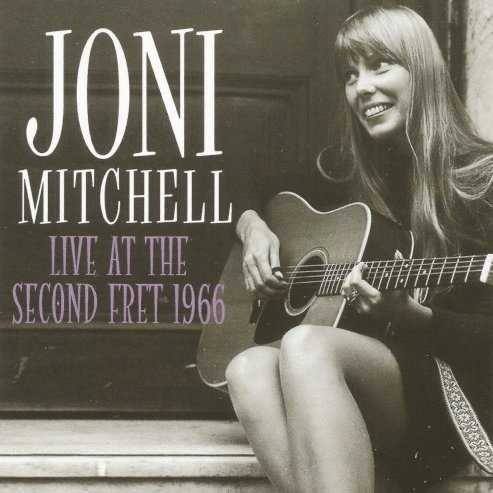 | Album: 32 of 33 Title: Live at the Second Fret 1966 Released: 2014 Tracks: 18 Duration: 1:18:55 Scroll: Up Down Top Bottom 25% 50% 75% Allmusic AlbumCover | 1 Little Green (06:17) 2 Marcie (05:59) 3 London Bridge (05:44) 4 Ballerina Valerie (02:08) 5 Michael From the Mountains (04:39) 6 Go Tell the Drummer Man (03:05) 7 I Dont Know Where I Stand (03:36) 8 Brandy Eyes (02:39) 9 Winter Lady (04:28) 10 Mr. Blue (03:49) 11 Urge for Going (06:06) 12 Both Sides Now (04:06) 13 The Circle Game (05:05) 14 Morning Morgantown (03:33) 15 (Born to) Take the Highway (04:01) 16 Eastern Rain (05:28) 17 Song to a Seagull (04:29) 18 Night in the City (03:36) |
| Live at the Second Fret 1966 : Allmusic album Review : In 1966, Joni Mitchell was two years away from recording her first album, and she was just another contemporary folksinger looking for her break when she was booked to play the Second Fret, then Philadelphia, Pennsylvanias premiere folk venue. While Mitchell wasnt yet a star, she had already written a handful of great songs that would go on to become classics (including "Both Sides Now," "The Circle Game," "Song to a Seagull," and "Urge for Going") and knew how to deliver them with the skill and confidence of a master performer. Live at the Second Fret 1966 is a document of one of Mitchells Philadelphia performances, and while the audio is less than perfect (it previously circulated as a bootleg), it delivers a fascinating portrait of one of the great singer/songwriters of the 70s on the cusp of stardom. Here Mitchells vocals and guitar work are sure and emotionally effective, and her personality retains a bubbliness and youthful sincerity that contrasts with the sometimes dour tone of her songs. For fans curious about Joni Mitchells early days as a musician, Live at the Second Fret 1966 reveals the talent was clearly there long before she was embraced by the mass audience. | ||
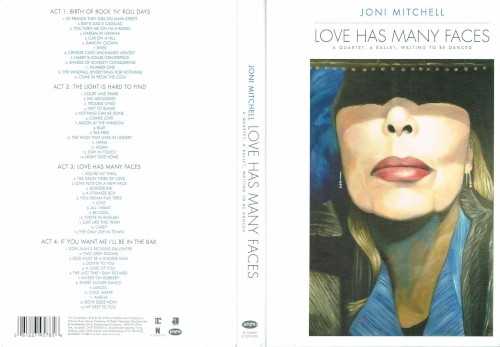 | Album: 33 of 33 Title: Love Has Many Faces: A Quartet, a Ballet, Waiting to Be Danced Released: 2014-11-17 Tracks: 53 Duration: 3:59:41 Scroll: Up Down Top Bottom 25% 50% 75% Allmusic AlbumCover | 1 In France They Kiss On Main Street (03:18) 2 Ray Dads Cadillac (04:33) 3 You Turn Me On Im a Radio (02:39) 4 Harlem in Havana (04:26) 5 Car on a Hill (03:02) 6 Dancin Clown (03:51) 7 River (04:05) 8 Chinese Café / Unchained Melody (05:18) 9 Harrys House/Centerpiece (06:47) 10 Shafes of Scarlet (04:58) 11 Number One (03:47) 12 The Windfall (Everything for Nothing) (05:13) 13 Come in from the Cold (03:36) 1 Court and Spark (02:46) 2 Not to Blame (04:18) 3 Nothing Can Be Done (04:52) 4 Comes Love (04:28) 5 Trouble Child (04:00) 6 No Apologies (04:15) 7 Moon at the Window (03:44) 8 Blue (03:03) 9 Tax Free (04:15) 10 The Wolf That Lives in Lindsey (06:33) 11 Hana (03:42) 12 Hejira (06:47) 13 Stay in Touch (02:58) 14 Night Ride Home (03:34) 1 Youre My Thrill (03:51) 2 The Crazy Cries of Love (03:53) 3 Love Puts On a New Face (03:46) 4 Borderline (04:48) 5 A Strange Boy (04:17) 6 You Dream Flat Tires (03:45) 7 Love (05:38) 8 All I Want (03:33) 9 Be Cool (05:09) 10 Yvette in English (05:17) 11 Just Like This Train (04:24) 12 Carey (03:03) 13 The Only Joy in Town (05:09) 1 Don Juans Reckless Daughter (06:38) 2 Two Grey Rooms (03:55) 3 God Must Be a Boogie Man (03:55) 4 Down to You (05:38) 5 A Case of You (04:23) 6 The Last Time I Saw Richard (04:58) 7 Raised on Robbery (03:06) 8 Sweet Sucker Dance (08:05) 9 Lakota (06:26) 10 Cool Water (05:25) 11 Amelia (06:46) 12 Both Sides Now (05:44) 13 My Best to You (02:54) |
| Love Has Many Faces: A Quartet, a Ballet, Waiting to Be Danced : Allmusic album Review : In the 60s and 70s, Joni Mitchell was widely seen as the archetypal female singer/songwriter, the original Lady from the Canyon who sang passionate but laid-back songs full of organic wisdom about love and life. Of course, that image was never an accurate portrait of the sort of artist Mitchell was -- emotionally she was never hesitant to cut deep, even on languid acoustic numbers, and her skills as a lyricist, vocalist, and guitarist were estimable. One might imagine that the ambitious, marvelously crafted jazz-pop of 1974s Court and Spark was an effort by Mitchell to prove she was more than just a moody girl with a guitar, and much of her subsequent music of the 70s and 80s was not just an expression of her eclectic muse, but an ongoing project to show off the range and intelligence of her musical impulses. Mitchell has long been overdue for a career-spanning box set, and shes finally delivered one with Love Has Many Faces: A Quartet, A Ballet, Waiting to Be Danced, a four-disc 53-song collection compiled, annotated, and designed by Mitchell with the stated intent of dealing with love and human interaction in its many forms. At the same time, Love Has Many Faces is a writ-large summary of Mitchells recorded legacy that finds her offering an idiosyncratic view of her career. A number of Mitchells most popular songs from her early days, including "Big Yellow Taxi," "The Circle Game," "Chelsea Morning," "Cactus Tree," and "Woodstock," are missing from the program, with Mitchell putting a greater emphasis on material from largely overlooked albums like Wild Things Run Fast, Chalk Mark in a Rain Storm, and Night Ride Home. (The fact Mitchell wants us to recall "Dancin Clown," an embarrassing duet with Billy Idol, is little short of astonishing.) Mitchell also presents several major selections in the orchestral re-recordings she created for the album Travelogue, and as she did on themed compilations such as Dreamland and Songs of a Prairie Girl, Mitchell has remixed a few of the tracks on this set. As a consequence, while most box sets are intended to summarize the career of an artist, Love Has Many Faces instead presents Jonis own preferred perspective on her music, where the jazzier and more stylistically ambitious creations take center stage and Joni the Folkie barely exists. Some fans might find this sets point of view to be a bit curious, especially since it favors less popular (and often less acclaimed) material over Mitchells more celebrated compositions, but in this context, many of these songs play significantly better than they did on her uneven projects of the 80s and 90s, and the lyrical strength and bold musical vision that inform this music are genuinely remarkable on nearly every tune. For many fans, Love Has Many Faces may not be the Joni Mitchell box set they want, but as a summation of her own musical world-view, its a powerful and revealing accomplishment. | ||